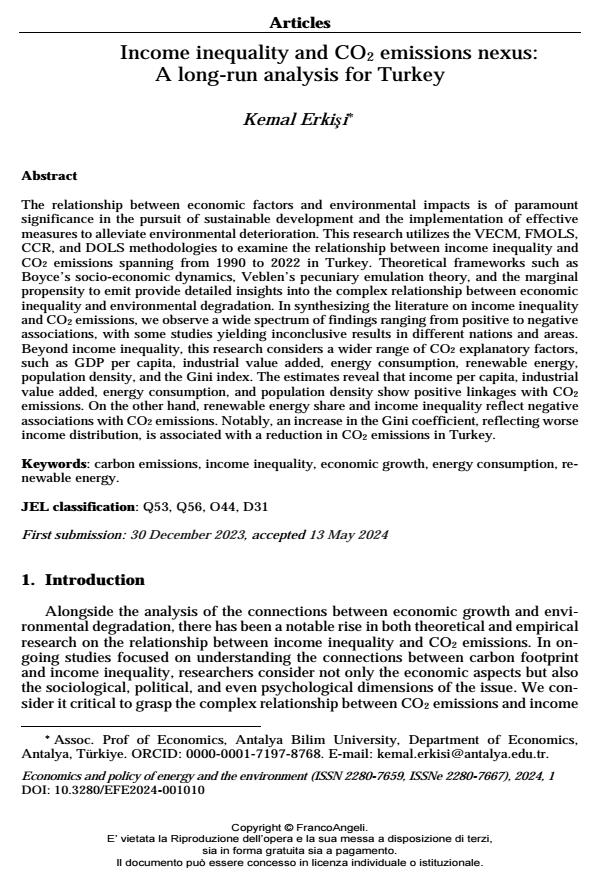Income inequality and CO2 emissions nexus: A long-run analysis for Turkey
Journal title ECONOMICS AND POLICY OF ENERGY AND THE ENVIRONMENT
Author/s Kemal Erkisi
Publishing Year 2024 Issue 2024/1
Language English Pages 21 P. 171-191 File size 319 KB
DOI 10.3280/EFE2024-001010
DOI is like a bar code for intellectual property: to have more infomation
click here
Below, you can see the article first page
If you want to buy this article in PDF format, you can do it, following the instructions to buy download credits

FrancoAngeli is member of Publishers International Linking Association, Inc (PILA), a not-for-profit association which run the CrossRef service enabling links to and from online scholarly content.
The relationship between economic factors and environmental impacts is of paramount significance in the pursuit of sustainable development and the implementation of effective measures to alleviate environmental deterioration. This research utilizes the VECM, FMOLS, CCR, and DOLS methodologies to examine the relationship between income inequality and CO2 emissions spanning from 1990 to 2022 in Turkey. Theoretical frameworks such as Boyce’s socio-economic dynamics, Veblen’s pecuniary emulation theory, and the marginal propensity to emit provide detailed insights into the complex relationship between economic inequality and environmental degradation. In synthesizing the literature on income inequality and CO2 emissions, we observe a wide spectrum of findings ranging from positive to negative associations, with some studies yielding inconclusive results in different nations and areas. Beyond income inequality, this research considers a wider range of CO2 explanatory factors, such as GDP per capita, industrial value added, energy consumption, renewable energy, population density, and the Gini index. The estimates reveal that income per capita, industrial value added, energy consumption, and population density show positive linkages with CO2 emissions. On the other hand, renewable energy share and income inequality reflect negative associations with CO2 emissions. Notably, an increase in the Gini coefficient, reflecting worse income distribution, is associated with a reduction in CO2 emissions in Turkey.
Keywords: carbon emissions, income inequality, economic growth, energy consumption, renewable energy.
Jel codes: Q53, Q56, O44, D31
Kemal Erkisi, Income inequality and CO2 emissions nexus: A long-run analysis for Turkey in "ECONOMICS AND POLICY OF ENERGY AND THE ENVIRONMENT" 1/2024, pp 171-191, DOI: 10.3280/EFE2024-001010